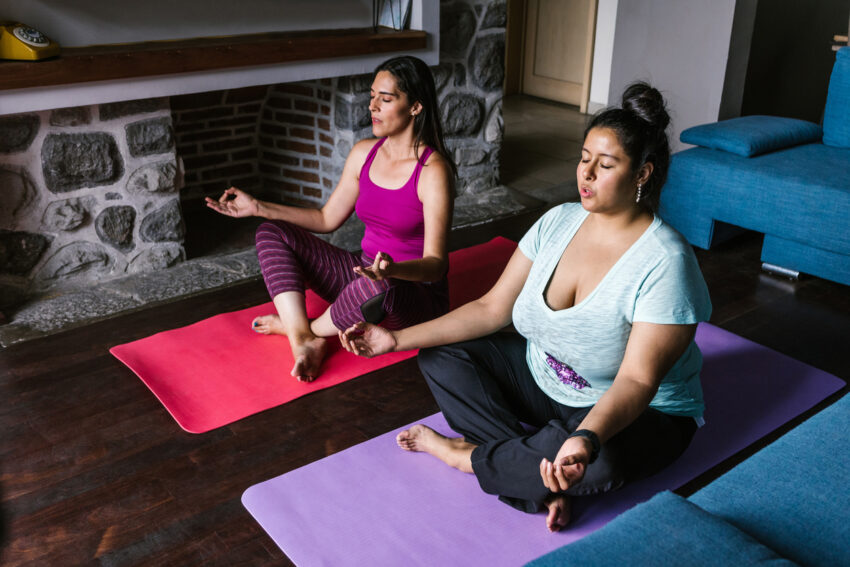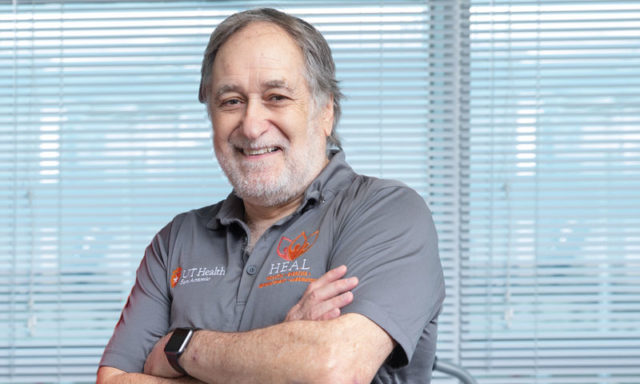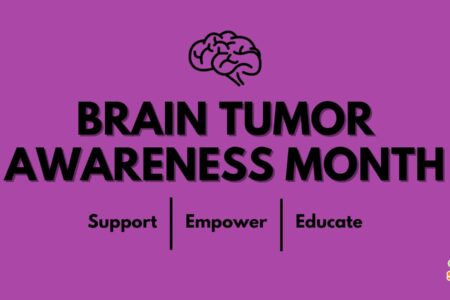
Share On Social!
A big challenge for cancer survivors is a disruption in “cognitive functioning.”
Stress can contribute to lapses in attention, memory, and other mental abilities that can limit a survivor’s daily activities and ability to work.
To help, researchers from UT Health San Antonio and UT San Antonio will test a 6-month therapeutic Yoga program — along with supportive text messages and dietary guidance — to improve cognitive functioning in 35 Latina and 35 non-Latina breast cancer survivors.
The pilot project, “Surviving is Not Enough: Enhancing Cognitive Function in Cancer Survivors through Movement and Introspection,” is led by Dr. Daniel Carlos Hughes, a researcher at the Institute for Health Promotion Research at UT Health San Antonio, and Dr. Joseph Houpt, professor of psychology at UTSA.
Drs. Hughes and Houpt have received a $50,000 grant for this project from the Cancer Moonshot program at Mays Cancer Center, an NCI-Designated Cancer Center at UT Health San Antonio.
“We anticipate that therapeutic yoga focused bodily movement, focused breathing, and mindful introspection will cause physiological markers of reduced neuroinflammation. This, in turn, will be associated with enhanced cognitive functioning and, ultimately, improved health-related quality of life,” Dr. Hughes said.

New Study Will Address Cognitive Functioning in Cancer Survivors
While many contributors can disrupt cognitive functioning, chronic stress may diminish the physical health of cancer survivors.
Stress hormones can impede immune function and shift the balance between pro- and anti-inflammatory cells.
“As the physical and mental challenges survivors face are intertwined, a treatment that can address the multiple sectors of dysfunction could be a crucial step in helping cancer survivors bridge the gap between surviving and thriving,” Dr. Houpt said.
To this end, Drs. Hughes and Houpt will explore cognitive function and immune system response of breast cancer survivors as they:
- complete therapeutic yoga sessions on mobility and mindful introspection three times a week for 24 weeks;
- receive support text messages via a telehealth application; and
- get optional anti-inflammatory dietary guidance.
Researchers will measure cognitive function multiple times across the intervention to track its effectiveness.
“We expect to get data to help us craft larger interventions to enhance cognitive functioning to truly improve health-related quality of life in a more diverse pool of survivors,” Dr. Hughes said.
For Dr. Hughes, the pilot project extends his work to improve life for cancer survivors.
He is part of a team — including Drs. Amelie G. Ramirez and Patricia Chalela at UT Health San Antonio — conducting a holistic intervention to improve Latina breast cancer survivors’ physical, mental, and spiritual well-being, thanks to a grant from Susan G. Komen. This project is based on pilot work in holistic care.
Dr. Hughes also leads the Holistic Exercise Advancement Laboratory (HEAL) at the Mays Cancer Center.
“Cancer survivors deserve more than to just survive,” Dr. Hughes said. “It is crucial we build our understanding of the many areas that are impacting their daily lives. This understanding will fuel programs to boost quality of life for survivors for the rest of their lives.”
Volunteer for a Clinical Trial for Your Familia!
Cancer and Alzheimer’s hurt many of our abuelos, moms, dads, and others we love.
Clinical trials help us fight for our familia.
Clinical trials are studies that help researchers learn more to help slow, manage, and treat Alzheimer’s and cancer for current and future family members. But without Latino volunteers for clinical trials, the benefits may miss this group.
Visit our clinical trials page to find a clinical trial, read about Latino hero volunteers, and more!
“Latinos in clinical trials are not only helping themselves, but they’re also building a future with better treatments that can help their families in the future,” said Dr. Amelie Ramirez, director of the Institute for Health Promotion Research and Salud America! at UT Health San Antonio.
By The Numbers
142
Percent
Expected rise in Latino cancer cases in coming years



